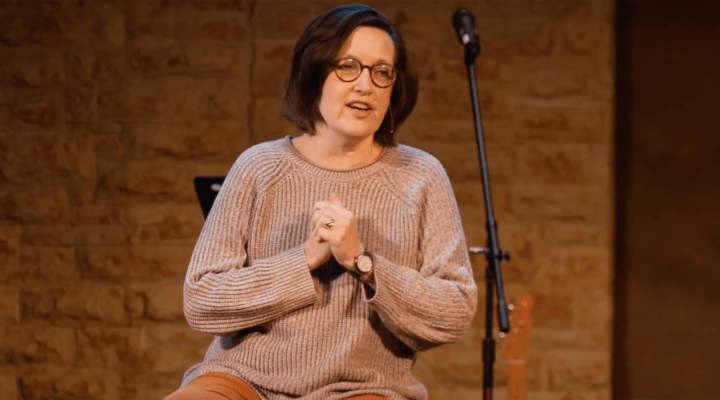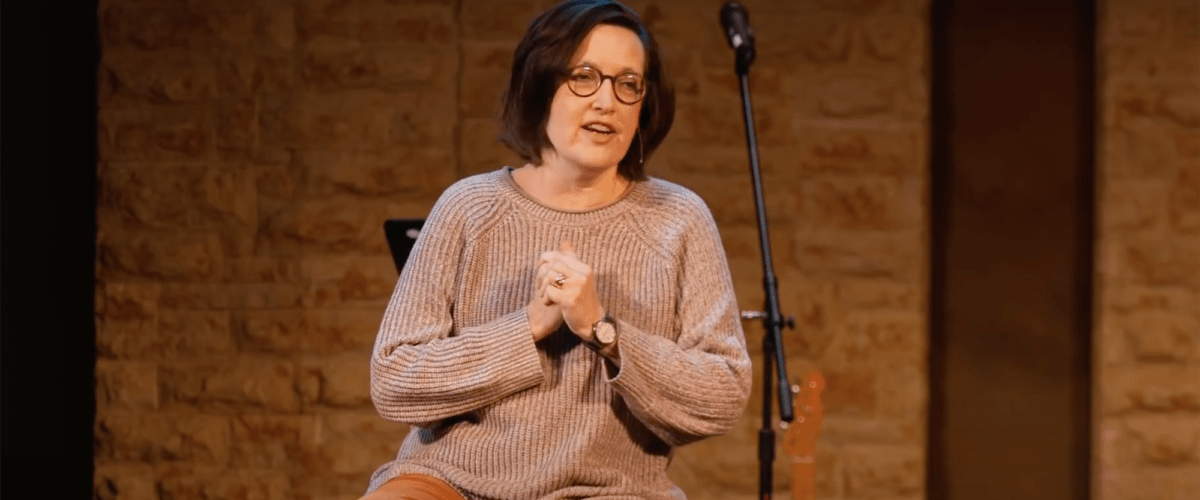In the past year, Sally Gary survived a global pandemic, helped start a church, wrote a book, and came out publicly to her Churches of Christ network as not only affirming the reality of same-sex attraction but also of same-sex marriage.
And at age 59, she got married to the love of her life, who also is a woman.
This year’s long journey is, in reality, the culmination of a lifelong journey infused with a conservative Christian faith, a deep love for the Bible and a passion for hospitality.
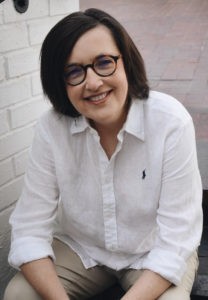
Sally Gary
Gary already had gained a following as leader of a group called CenterPeace, which helps churches, schools and families have conversations about faith and sexuality in a more Christ-like way. Founded in 2006, CenterPeace hosts an annual conference and seeks to provide a place to belong for the LGBTQ community in and beyond the Churches of Christ.
Its mission is to “welcome grace-filled dialogue and respectful disagreement with all who come to the table, acknowledging Jesus as the CenterPeace of our existence.”
A second coming-out
Coming out of the Church of Christ tradition, that was bold enough. And for 14 years, Gary did so with the public affirmation that same-sex attraction is not sinful while affirming celibacy as the greatest gift for those not able to marry in the traditional Christian way.
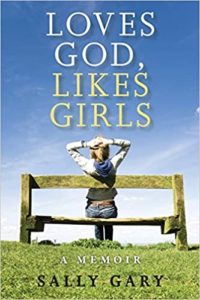 She genuinely believed that. She even wrote her first book about it, Loves God, Likes Girls. But over time, that was not enough.
She genuinely believed that. She even wrote her first book about it, Loves God, Likes Girls. But over time, that was not enough.
“When I was young, I didn’t realize how lonely I was,” she said in a recent interview. “I didn’t recognize it as loneliness. I’m the outgoing, gregarious kid who never meets a stranger. I can’t acknowledge that and admit it. … But that loneliness was about to eat me up.”
Originally, her more traditional view of same-sex relationships allowed that “my being gay was not a choice, but I could make the choice to live a celibate life, as I believed at that time I was called to do. That’s what all of us who have grown up in the church have been taught.”
And she still believes there’s “nothing wrong with that if God calls you to that. But God also said it was not good for us to be alone, and when I look at the rest of Scripture through that lens, then I have to ask the question, ‘Why is it we have spent so little time, if any, trying to find ways to help people not live alone?’”
The Christian church historically has “not done a lot for anybody who is single,” she said. “If you are going to call someone to celibacy, how are you going to take care of that need for relationships beyond a potluck?”
“If you are going to call someone to celibacy, how are you going to take care of that need for relationships beyond a potluck?”
Along the way, she met Karen and for the first time in her life realized there might be a partner she could spend her life with. “Not in my wildest dreams” had she imagined such a possibility she said at her second coming out. That happened at her own CenterPeace conference in Dallas on Oct. 23, 2020, during the height of the coronavirus pandemic.
There, speaking mainly to a virtual crowd, she gave a keynote address to explain her journey and introduce Karen. She knew this would be difficult for some to hear, and she knew it would be joyous for others to hear.
A story she had to tell
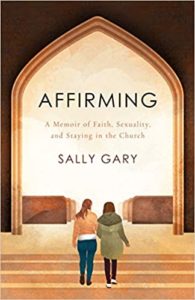 How she got from the first book to the present moment is the subject of her new book, just released, Affirming: A Memoir of Faith, Sexuality and Staying in the Church.
How she got from the first book to the present moment is the subject of her new book, just released, Affirming: A Memoir of Faith, Sexuality and Staying in the Church.
While she got some negative feedback after her announcement at the October conference, so far response to the new book has been positive. Yet she realizes the way church life often works: “Church culture is such that if there is backlash and it is against a woman who typically we have liked, we won’t be ugly to her, but we will sure talk about her behind her back.”
So she’s realistic to know that her change of mind won’t be well-received by everyone. Yet this is a story she feels compelled to tell.
“That calling to write this, I believe, began to be more urgent to me in this last year especially. Being stuck inside, I was able to write uninterrupted and finish the book.”
Amid the pandemic, the book was fast-tracked by Eerdmans and went from manuscript to published book in seven months. And it immediately began selling beyond the publisher’s expectations.
The book is intended for “anyone who loves someone within the LGBTQ community,” she said. “I hope LGBTQ folks like myself will pick it up and be encouraged, will be reconnected with God. I pray that church leaders will pick it up and realize we’ve got to rethink how we respond. We’ve got to stop turning people away.”
‘I couldn’t be quiet anymore’
Gary previously worked with college students at Abilene Christian University, a Churches of Christ school in West Texas. And through CenterPeace she now works with many youth and young adults and their families. She has heard their stories, seen the pain in their faces and realized the church is often doing more harm than good.
“I’ve seen too many kids who haven’t just walked away from the church, they’ve walked away from God, want nothing to do with Christianity.”
“I couldn’t be quiet anymore,” she explained. “I’ve seen too many kids who haven’t just walked away from the church, they’ve walked away from God, want nothing to do with Christianity. The concept of a church family is terrifying to them. That just breaks my heart.”
Church family and Scripture and a love for Jesus are essential beliefs for Gary, who grew up in the Churches of Christ tradition in Wichita Falls, Texas, and later went to law school before ministering to students at ACU.
Kids today have so much more opportunity to address their sexuality and maintain relationships than her own generation did, Gary said. “There’s all the difference in the world.”
She noted the positives of “talking early and being open early, having parents who are equipped to say, ‘I love you period.’ There is so much access to information in the palm of your hand that kids can go online and learn what they need to learn.”
But that’s not enough, she added: “Will they learn that from a Christian perspective? Will they learn that the church is a safe place to ask questions about their sexuality? That’s what we still don’t do in churches. The secular realm gives all the information.”
“Will they learn that the church is a safe place to ask questions about their sexuality? That’s what we still don’t do in churches.”
The very future of the church is at stake, she warns. “If the church doesn’t rise up and say, ‘We’re going to talk about this, … we will continue to lose our youth. Not just our gay and trans kids, but our straight kids as well.”
Long-term relationships
Part of the conversation the church needs to foster is about the ability for same-sex couples to enter long-term monogamous relationships just the same as heterosexual couples, Gary said.
Good Christians who oppose same-sex relationships have bought into myths “without really getting to know the people they’re talking about,” she said. “They don’t know the couples, both male and female, that I know that have been together 25 or 30 years and have been in monogamous relationships.
“From my own experience, I have no desire to be in any other kind of relationship. God calls us to commitment, to fidelity. That is what I’ve always wanted. My intention is to live the rest of my life with Karen.”
And contrary to popular mythology, same-sex attraction is not just about sex, she added. “I can only speak for myself, but for me, there’s never been a sexual attraction without an emotional attraction. Most importantly, a spiritual attraction.”
“Same-sex attraction is not just about sex.”
She likes to tell the story of once talking to a group of church elders and asking them what is the most important thing about their marriages. “How many would say the sexual relationships?” she asked.
They admitted that wasn’t the answer at all, she reported. “They would tell me about … having somebody to have dinner with and sit in silence with and all those things we take for granted.”
‘But the Bible …’
To those who reply, “But the Bible… ,” Gary will meet them in conversation point-by-point. She knows that perspective because it was her own perspective most of her adult life.
“Scripture is very important to me,” she said. “That’s why it took as long as it did. I needed somebody who dealt with Scripture the way I had been taught to deal with Scripture and say, ‘We don’t know all these things.’”
Asked about a series of books published within the last decade that address the so-called “clobber” passages from an affirming standpoint, she replied that none of them convinced her. Until she found James Brownson’s book: Bible, Gender, Sexuality: Reframing the Church’s Debate on Same-Sex Relationships.
Even then, it was not that one book that caused her to see Scripture in a new light, she said. “It is not one book, not one conversation, not one interaction or experience. It was a lifetime of learning who God is. It’s learning what the purpose of Scripture is. It’s much, much bigger than I ever imagined.”
Again, she understands the fears Bible-loving people have about entering open conversation about LGBTQ identity because she had the same fears.
“While my whole view of Scripture changed, my picture of God got bigger, and the relevance of Scripture for my life was more than it had ever been.”
“Sometimes it’s really scary for people to even think about altering something they believe about the Bible or God for fear they will lose it all,” she said “I felt that way. I was afraid. What I came to realize was that while my whole view of Scripture changed, my picture of God got bigger, and the relevance of Scripture for my life was more than it had ever been. I could see the goodness of Scripture in a way I had never seen before.”
Now, “my heart breaks,” she said, for Christians who are held back out of fear. “Sometimes our picture of God is just too limited.”
Why the Churches of Christ?
To that point, outside observers might wonder how someone like Gary can continue to find a home in the traditionally conservative Churches of Christ.
“There’s such diversity within the Churches of Christ, within congregations,” she explained. “There are some Churches of Christ that would have a more loving response than some evangelical churches. The stories I hear are not limited to Churches of Christ. There are some (evangelical churches) that you dare not even breathe that you are gay, let alone that you are in relationship. It’s a sin to be gay, to call yourself gay.”
She’s still so much at home in the Churches of Christ that she’s currently helping start a new congregation in Dallas.
The church start has been hampered some by the pandemic but has persisted and discovered an international congregation through its online presence.
The core leadership of the new congregation voted “from the very beginning,” she said, not only to be fully inclusive but to highlight its open and affirming stance in the tagline along with the church’s name.
When formally launched, it will be the third fully inclusive Churches of Christ congregation in the United States.
When formally launched, it will be the third fully inclusive Churches of Christ congregation in the United States, she said.
She’s not the pastor or primary leader of the church but is actively involved in the effort. That’s part of her passion, as much as CenterPeace.
“I had encountered too many people for too long who said, ‘I can’t find a church where I feel comfortable and where I can be my authentic self.’ We thought why not keep the very best part of our tradition, get rid of some of the things that are not from Jesus and move forward.”
The God-given need for relationship, after all, should be answered by the church, Gary said. “What I know of church family is good and necessary and something I don’t ever want to be without.”
Related articles:
Couple helps parents of LGBTQ kids come out of the closet
10 things we’re learning about the LGBTQ debate in the church | Opinion by Mark Wingfield
My journey toward LGBTQ inclusion: God still speaks | Opinion by Chris Conley
On LGBT: What I have learned since ‘Changing Our Mind’ | Opinion by David Gushee
My quest to find the word ‘homosexual’ in the Bible | Opinion by Ed Oxford

